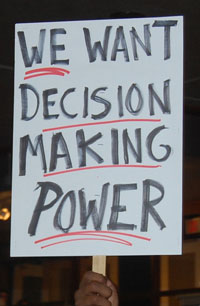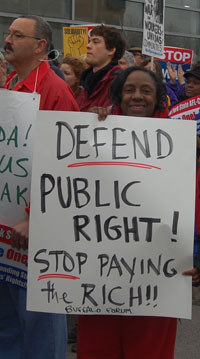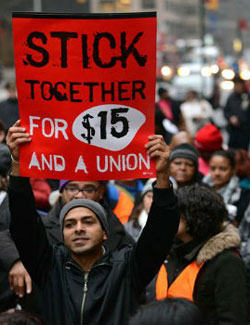Democracy Requires Restricting Executive Rule, Expanding Role of Public
• What to Look for in Obama’s State of the Union
• Obama Emphasizes Increased Use of Executive Power
• President Acts to Decide Wages of Federal Contract Workers
What to Look for in Obama’s State of the Union
 President Barack Obama will be giving his State of the Union address before both houses of Congress tonight, with Supreme Court members and the military’s Joint Chiefs of Staff also in attendance. The State of the Union commonly focuses on national issues, mainly the economy, and includes a dozen or more proposals of various kinds. The administration has already indicated, for example, that Obama will call for raising the federal minimum wage and extending long-term unemployment benefits.
President Barack Obama will be giving his State of the Union address before both houses of Congress tonight, with Supreme Court members and the military’s Joint Chiefs of Staff also in attendance. The State of the Union commonly focuses on national issues, mainly the economy, and includes a dozen or more proposals of various kinds. The administration has already indicated, for example, that Obama will call for raising the federal minimum wage and extending long-term unemployment benefits.
Obama will also no doubt reiterate a main theme of recent speeches, which is that he will be taking more executive action (see articles below). He has emphasized that 2014 is to be a year of action and he will not wait for Congress. As he put it recently, speaking to U.S. mayors at a White House reception January 23: "I want to work with Congress whenever and wherever I can, but the one thing I'm emphasizing to all my Cabinet members is we're not going to wait." He said, "Where Congress is debating things and hasn't been able to pull the trigger on stuff, my administration is going to move forward and we're going to do it in partnership with all of you." He repeated, "I've got a pen and I've got a phone. And that's all I need."
Three things to look for in Obama’s speech are: 1) the call to follow the president as he acts without Congress, or as he puts it “my administration is going to move forward and we're going to do it in partnership with all of you;" 2) the emphasis on public-private partnerships and expanding them; 3) the changes in governing arrangements that these and similar proposals represent.
Obama is speaking before Congress in the Congressional chamber. It is significant that he will use this location to effectively say, the Office of the President is going to govern, not Congress.
It is Congress that is a public body, that legislates. It is a place where, however limited, there is space for public debate, public hearings, at least a semblance of concern for the public good. But at this stage, that is no longer the case. Congress has collapsed as a public authority. This was evident in the recent passing of the federal budget, where there was only one giant bill, no amendments, no public hearings, no serious debate, and within a few days a single up or down vote in both houses. In this context, for Obama to emphasize that he will not wait and he will move forward is effectively to say, this is the end of the role of the public in public governance, and it is the president, and the executive at all levels more generally, that has sole authority. The choice for the public is to “partner” with the president, or face the consequences.
The proposals for expanding public-private partnerships are also characterized by further limiting the role of the public in governing public institutions like public universities, and instead facilitating their take over by private interests. Private interests are to decide curriculum, faculty and similar matters, in a manner that favors them, not the public. No doubt an examination of the examples Obama gives will confirm this.
[TOP]
Obama Increasing Use of Executive Power
 In recent speeches President Obama has emphasized that 2014 will be a year of action that sees increased use of executive power. Speaking to his cabinet January 14 Obama said, “We’ve got a lot to do in 2014. As I’ve said before this is going to be a year of action.” He added, “We are not just going to be waiting for legislation in order to make sure that we’re providing Americans the kind of help that they need. I’ve got a pen and I’ve got a phone — and I can use that pen to sign executive orders and take executive actions and administrative actions…And I’ve got a phone that allows me to convene Americans from all walks of life — non-profit, businesses, the private sector, universities — to try to bring more and more Americans together around what I think is a unifying theme: making sure that this is a country where if you work hard, you can make it.” He repeated that this is an “all hands on deck” situation and that it is necessary for all to work “in the same direction.”
In recent speeches President Obama has emphasized that 2014 will be a year of action that sees increased use of executive power. Speaking to his cabinet January 14 Obama said, “We’ve got a lot to do in 2014. As I’ve said before this is going to be a year of action.” He added, “We are not just going to be waiting for legislation in order to make sure that we’re providing Americans the kind of help that they need. I’ve got a pen and I’ve got a phone — and I can use that pen to sign executive orders and take executive actions and administrative actions…And I’ve got a phone that allows me to convene Americans from all walks of life — non-profit, businesses, the private sector, universities — to try to bring more and more Americans together around what I think is a unifying theme: making sure that this is a country where if you work hard, you can make it.” He repeated that this is an “all hands on deck” situation and that it is necessary for all to work “in the same direction.”
The fact that Obama is now openly stating that he will use executive actions shows current governing arrangements have taken power from Congress and concentrated it in the executive office. Congress is the one that is supposed to legislate, to make the laws, while the executive is supposed to execute them. Instead, Obama is stating that he will not wait for Congress and will take executive action. He is attempting to use the great anger and dissatisfaction with Congress to win support for governance that eliminates the role of the public, the public good and public authorities like Congress, while concentrating power in the presidency.
In the government shutdown and battle over the debt crisis last October, Obama indicated that he will be taking more executive actions. For the debt he emphasized that he will not allow a default to occur. While the budget appropriations bill has now been passed, the debt ceiling battle remains, likely in March. Will Obama, in the name of “taking action” to “help Americans” use executive orders then, not waiting for Congress? Will the president seize the power of the purse? Will Obama justify such action and attempt to rally “Americans from all walks of life” to support him saying it is needed to “provide Americans the kind of help they need?” Given the continued anger with Congress and its dysfunction, this is a real danger. Such executive actions serve to further restrict and eliminate the role of the public while protecting the financiers and debt payments to them.
Obama also said “We need to get immigration reform done.” Will he decide not to wait for Congress and instead use his executive power to require use of E-verify by all monopolies, something the monopolies support? There is funding included in the budget appropriations for such action. E-verify (electronic verification of identity and authority to work) means in the next few years all workers will be required to get federally issued biometric ID, including passing FBI and “national security” background checks. Such a system enables the federal government to control and regiment the entire workforce for the benefit of the monopolies. This includes not issuing ID to anyone the government decides is not “working in the same direction,” such as union or other organizers and all those who resist. It means those who do not support the current direction of the economy for war and empire could be targeted. And as many have already experienced with deportations, no-fly lists, indefinite detention and torture at home and abroad, executive rule means the executive acts as judge, jury and executioner.
Public Private Partnership Serves Private Interests
Speaking January 15 in North Carolina Obama again emphasized, “Where I can act on my own, without Congress, I’m going to do so.” As an example of that action he announced a $140 million public-private partnership being developed by a consortium of eighteen monopolies and six universities at North Carolina State University (NCSU), the Next Generation Power Electronics Institute. The federal government is providing $70 million in funding over five years, to be matched by $70 million provided jointly by North Carolina, the six public universities, and the monopolies. The other universities currently involved are: University of North Carolina at Chapel Hill, Arizona State University, Florida State University, University of California at Santa Barbara and Virginia Tech.
North Carolina Commerce Secretary, who attended the speech, brought out that these public-private partnerships serve the monopolies. She said having the institute will ensure the research at the state’s prestigious universities is turned into commercial products.
There are many vital educational matters, including theoretical work, that are not related to producing “commercial products.” The public-private partnerships are being used to eliminate this conception of public universities for the public good, and replace them with public universities and funds for the narrow private interests of the monopolies competing for world domination. Obama, with his executive actions, is ensuring the expansion of such partnerships, while also reflecting the elimination of the role of the public in public matters, like use and control of public funds and public universities. It is a direction that is anti-social and against the public good.
[TOP]
Obama Acts to Decide Wages
of Federal Contract Workers
 On the day President Obama gave his State of the Union address, the White House announced that Obama “will use his executive authority to raise the minimum wage to $10.10 for those working on new federal contracts for services. This action will cover workers who are performing services or construction and are getting paid less than $10.10 an hour. Some examples of the hardworking people who would benefit from an Executive Order include military base workers who wash dishes, serve food and do laundry.” There are about two million Americans currently working as federal contract workers. About 75 percent of these workers earn less than $10.10. But these workers will not receive the raise — only workers hired for new contracts will be eligible.
On the day President Obama gave his State of the Union address, the White House announced that Obama “will use his executive authority to raise the minimum wage to $10.10 for those working on new federal contracts for services. This action will cover workers who are performing services or construction and are getting paid less than $10.10 an hour. Some examples of the hardworking people who would benefit from an Executive Order include military base workers who wash dishes, serve food and do laundry.” There are about two million Americans currently working as federal contract workers. About 75 percent of these workers earn less than $10.10. But these workers will not receive the raise — only workers hired for new contracts will be eligible.
It should be remembered that there has been and continues to be major fights waged by federal workers, and public sector workers more generally against contracting out. Contracting out has already served to lower wages, pensions and working conditions, as it commonly eliminates or undermines unionized workers. The fact that 75 percent of contract workers make less than $10.10 and many likely make at or near the existing federal minimum wage of $7.25 is an indication of this. So while the wages of federal workers have been frozen for three years and they are getting only a one percent raise this year, which is still a cut given inflation, Obama is calling for this increase for workers of federal contractors. It is a means to further impose two and three-tier wage systems, which are efforts to divide and weaken the workers and their resistance, while appearing to support workers. What is needed is to have all federal workers, including those under federal contracts, paid the same for the same work and paid at a level on a par with U.S. living standards.
In addition, there is the precedence of the president intervening to set wages for a specific sector of workers. What will prevent similar actions for other sections of the federal workforce, including wage freezes or similar measures. In various places where the executive has been given powers to decide wages and contracts, such as Detroit Emergency Managers, or Buffalo’s Control Board, it has meant broad attacks on the workers. Executive power is being used to remove the role of the public and public governance, and in this case the role of unions and negotiations by the workers on the wages and conditions. Contracting out has already played a major role in doing this and Obama is acting to further strengthen this attack. The role of the workers in deciding, like the role of the public, must be expanded and further developed to take things in the direction of a modern democracy. This action by Obama does the opposite.
[TOP]
